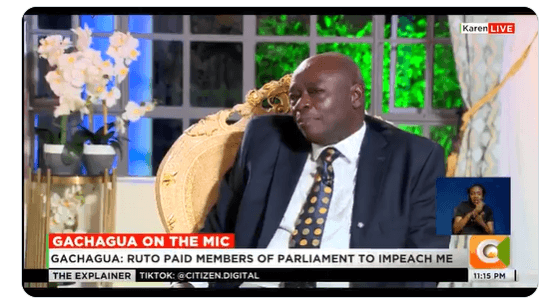“President William Ruto bought Siadian Bank immediately when we came into office, and it has grown massively from Sh 300 Million profit to Sh1.2 Billion profit”, Rigathi Gachagua says during an interview with Yvonne Okwara.
Former Deputy President Rigathi Gachagua has made explosive claims, alleging that Sidian Bank, purportedly linked to President William Ruto, is amassing wealth through housing levy and Social Health Authority (SHA) deductions from Kenyan salaries.
In a February 2025 interview on KTN News, Gachagua suggested that the bank’s massive growth is tied to its role in handling billions from these controversial programs.
The accusations, also repeated on August 26, 2025, have intensified scrutiny of Ruto’s administration, raising questions about transparency and potential misuse of public funds in Kenya’s financial and political landscape.
Gachagua’s claims centre on Sidian Bank’s alleged role as a conduit for funds collected from the 1.5 percent housing levy and 2.75 percent SHA deductions, which have sparked public outrage for slashing take-home salaries by up to 45 percent.
He hinted at a shadowy scheme involving a senior official, widely speculated to be Ruto, using the bank to funnel nearly KSh 100 billion from these levies.
People question Sidian’s rapid expansion despite a reported Sh447.96 million net loss in 2023. The bank’s ties to Centum Investment and its acquisition by a UAE-based firm in 2024 further fuel speculation of hidden agendas.
The housing levy, introduced under the Finance Act 2023, and the SHA, replacing the National Health Insurance Fund, have faced legal challenges for their discriminatory impact on salaried workers.
Critics, including the Kenya Human Rights Commission, argue that these deductions burden Kenyans while offering little tangible benefit.
Gachagua’s allegations suggest that Sidian Bank’s growth is not organic but driven by its designation as a collection point for SHA contributions, alongside banks like KCB and Equity.
One critic claimed, “Sidian was bankrupt until Ruto’s involvement,” echoing Gachagua’s narrative of political interference in financial institutions.
The bank’s financials, supported by long-term financing from entities like the East African Development Bank, raise questions about its capacity to handle such large inflows.
"Sidian Bank, owned by President Ruto, is receiving housing levy and SHA deductions from Kenyan salaries; that is why it has grown massively," Former Deputy President Rigathi Gachagua! pic.twitter.com/xUIE269Ro8
— The Kenyan Vigilante (@KenyanSays) August 26, 2025
As Kenya grapples with economic strain, Gachagua’s allegations of Sidian Bank’s role in SHA deductions and housing levy funds have sparked calls for transparency.
Ruto’s administration defends the levies as essential for affordable housing and universal healthcare, but critics argue they enrich connected entities like Sidian Bank.
The controversy surrounding Sidian Bank’s massive growth highlights broader concerns about corruption in Kenya.

















